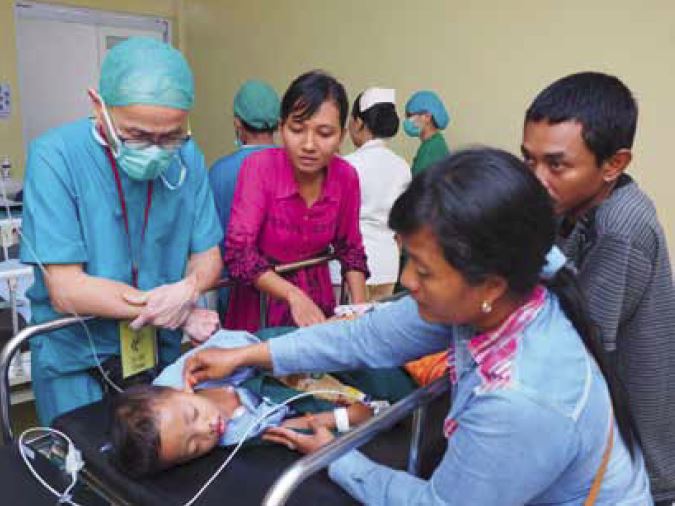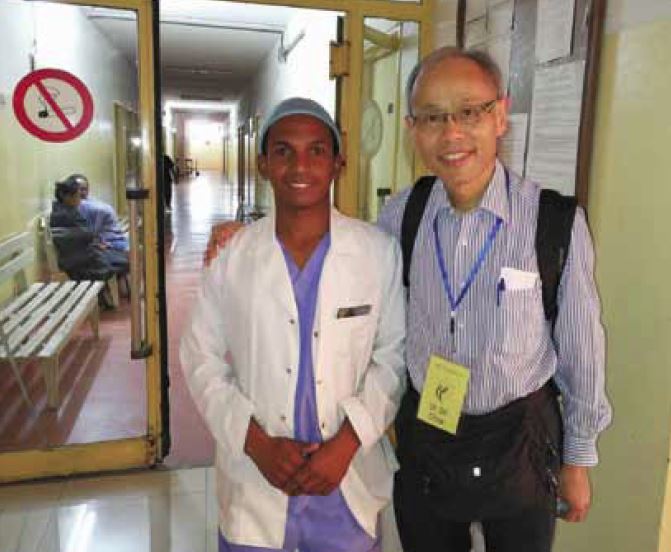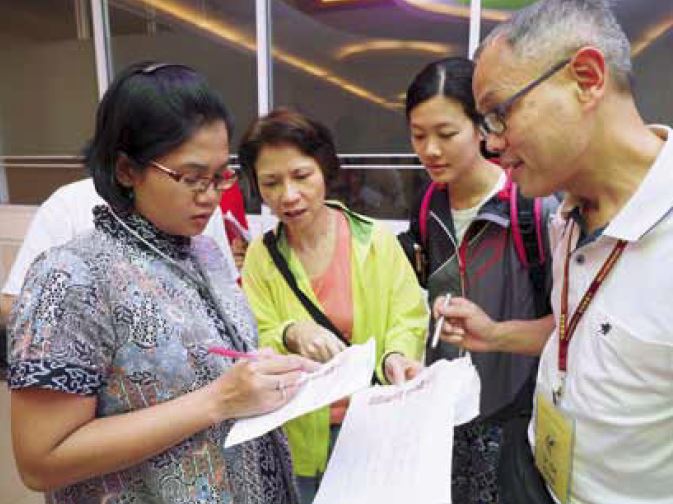© Hong Kong Academy of Medicine. CC BY-NC-ND 4.0
DOCTOR FOR SOCIETY
Putting a smile on children’s faces: an interview with
Dr Bernard Sik-kuen Chow
Waylon WL Chan; Apple TY Lo; Katherine Wong
Year 5 MBChB, The Chinese University of Hong Kong
In this issue of Doctor for Society, we
interviewed Dr Sik-kuen Chow, who was awarded a 2017 Hong Kong Humanity
Award by the Hong Kong Red Cross and Radio Television Hong Kong. The
award gives ‘tribute to individuals in society who exemplify the very
spirit of humanity by putting it into practice and action’.
A smile can brighten up your entire day. For those
with cleft palate, the clichéd axiom rings especially true when the
ability to properly smile can brighten up an entire life. Dr Bernard
Sik-kuen Chow, a plastic surgeon with three decades of experience, has
devoted himself to putting back precious smiles on the face of children
with congenital defects. Dr Chow has worked hard for years as the chairman
of the HIS Foundation (天鄰基金會), a non-profit Christian charitable
organisation focused on helping the impoverished in China. Along with the
cleft lip and palate surgical team of the HIS Foundation, he has been
toiling away to offer patients a better life.
As we watched the twilight sun rapidly fading, Dr
Chow sat in his office, having just finished with the last patient of the
day. He began to tell us about his long journey in humanitarian work, and
the experiences he has gathered along the way. The numerous placards and
accolades in his office do not faze him; he seeks neither recognition nor
fame in his quest to better the world in his own way. It was apparent
throughout the interview that Dr Chow is a man of deep religious faith,
committed to his cause of serving the underprivileged in the best way he
can.
History, mission, and other works of the HIS Foundation
The HIS Foundation was established in 1992 to offer
a helping hand during times of natural disasters and crises, eventually
expanding to medical service trips, education work, and poverty reduction
programmes. In addition to cleft lip and palate surgery, medical teams
from ophthalmology, dentistry, orthopaedics, and internal medicine provide
outreach services. The Foundation’s education arm arranges summer camps,
teacher training and basic health classes, while giving talented students
a ticket out of poverty through scholarships in higher education. The HIS
Foundation has been involved in the reconstruction of numerous schools and
a hospital since 2002, improving lives in the regions they visit. As a
Christian organisation, the Foundation relies on dedicated local Christian
volunteers to perform selfless acts of kindness for people in different
regions of the world.
The journey to become a smile-maker
Dr Chow’s path to medicine started with a book by
Tom Dooley, a doctor who flew to remote corners of the world to assist
those in need. Inspired by his humanitarian work in the dense jungles of
Laos and Vietnam, Dr Chow chose to study medicine and graduated from The
University of Hong Kong in 1975. He specialised in general surgery at the
Queen Mary Hospital, until by chance he came across a seminar on plastic
surgery. The seminar opened his eyes to the field of plastic surgery, a
specialty of which he knew little. The description of cleft lip surgeries
and burn contractures intrigued him, sparking his interest in plastic
surgery. It was an area where there was a very good prognosis for
patients, unlike general surgery where long-term outcomes remained
unfavourable. Making a positive change for patients that could last for
many years seemed inherently attractive. As such, he was trained at the
Princess Margaret Hospital in a plastic surgery subspecialty until 1988.
Dr Chow rejects the misperception that plastic surgery is largely
cosmetic; on the contrary, it plays a major role in treating congenital
defects such as cleft lip and palate, hypospadias, and ptosis of the upper
eyelids, accidental deformities following traffic or industrial accidents,
and diseases such as skin cancers. Describing himself as someone who is
eager for quick results, he felt plastic surgery suited him best.
Dr Chow saw how people with faith found inner
peace, and he decided to embark on his own search for faith. He eventually
found his religious calling in 1991, and committed to Christianity in May
1993. He asked his pastors to tell him of medical missions where he could
offer a helping hand. His first mission was to Kenya in 1994 for 2 weeks,
offering free surgical services. After returning to Hong Kong, a chance
encounter with an old university friend led to his introduction to the HIS
Foundation. Dr Chow was soon offering his services in Henan (河南省) through
the Foundation where he was needed.
Humanitarian work in China and other countries
When Dr Chow first went to mainland China in 1995
for his missions, he recalled the scenes of uneven development. Even the
airport in the provincial capital of Henan, Zhengzhou, was rundown and
lacking in facilities, with desolate surroundings. It was apparent early
on in his visit that the rural-urban gap was large. Those in rural areas
lacked access to basic medical facilities, infrastructure, and
communication networks. He realised there was a need for his expertise by
rural patients who had little access to surgical services, owing to both
geographical and financial constraints. He started by providing a variety
of surgical services and soon noticed that if he focused on one particular
area of surgery, he could train local medical staff to perform certain
procedures and thereby help more people. Dr Chow ultimately chose cleft
lip and palate surgeries, since such surgeries could have a lasting impact
on a patient’s quality of life.
Although he started his work in Henan, Christian
organisations soon referred patients to him from other regions of China.
Since some had to travel many hours to reach the hospital, Dr Chow decided
to travel to them instead, going to cities in Shandong (山東), Guangxi (廣西),
and Qinghai (青海). Demand for his services grew after news of successful
operations reached other cities, prompting Dr Chow to organise four to six
mission trips to China every year. He has also expanded his service
overseas to Indonesia and Madagascar, where his skills were required.
Overcoming challenges for the organisation
Dr Chow’s humanitarian experience has not been a
smooth ride. When he first started, there was a lack of trust between his
team and the hospitals with which he worked. Dr Chow sought out hospitals
that offered a place to perform surgery, but hospitals were often
reluctant to place their trust in unknown doctors, as it would invite
scrutiny should things go wrong. In addition, they sometimes lacked
resources and personnel to assist Dr Chow in his work. With much effort
and dedication, he and his team gradually established a working
relationship with the hospitals and built up their capacity to handle more
complex surgeries.
As the Foundation is a non-governmental
organisation operating in mainland China, following local rules and laws
have posed certain challenges. These regulations have at times restricted
the ability of Dr Chow’s team to deliver help. For instance, despite being
a charitable organisation based on the Christian faith, it is prohibited
from any form of preaching. Volunteers are instead encouraged to preach
through their actions instead of words. It is important to satisfy local
requirements in order to continue delivering much-needed help to those who
require it.
Humanitarian work often demands personal sacrifices
as well, where frequent service trips can affect family life and
relationships. This makes the effort of Dr Chow and fellow volunteers all
the more notable considering their unspoken personal sacrifices.
Advice to doctors who are considering service trips
Many doctors choose this profession out of a desire
to help people in need, so it is not surprising when doctors show an
interest in service trips. Yet it is far from the only way to help people
in need. For those who cannot leave Hong Kong for extended periods of
time, for personal reasons or otherwise, Dr Chow says there is a lot of
local charity work available. Many immigrants from mainland China have few
possessions, do not have a social support network, and thus require people
to care for them. Others who choose to trek long distances to Hong Kong
for medical services not available in mainland China often need assistance
as well. For medical professionals who cannot join service expeditions,
helping the underprivileged living in Hong Kong is well worth considering.
Before embarking on a service trip, Dr Chow
emphasises the importance of understanding local cultures. The cultural
practices in rural areas can be drastically different to those we are
accustomed to in Hong Kong, and we must accommodate different beliefs
while grasping their effects on health practices and treatment outcomes.
Most importantly, he hopes that future doctors will
be able to find their own faith during their career. Dr Chow has
personally benefited greatly from his faith, overcoming fears and
difficulties during his career. Religion has played a major role in Dr
Chow’s life, pushing him to perform his work.
Dr Chow is a perfect example of how doctors can use
their knowledge and skills to build a better world. We wish Dr Chow the
best in his future work, and look forward to seeing him put more smiles on
the faces of more people across the world.
Families love to have pictures with voluntary workers to show and tell their children when they grow up, “when you were young, a Christian surgical team did a free operation on you, so you should help any needy people whenever you can”

Dr Chow (far left) checking a cleft lip patient with his parents in the recovery room immediately after surgery in Indonesia in March 2015



